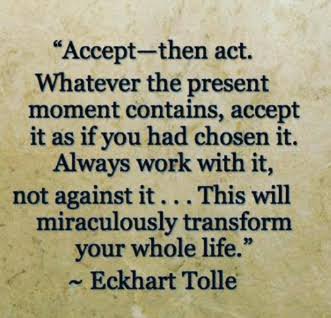The Transforming Power Of Acceptance
Experience The Power Of Acceptance
This website contains about one million words. You could read every single word and it wouldn't make any real difference to you. You might become better informed, but that won't change you.
The act of acceptance involves turning towards pain.
Acknowledge with humility your suffering, your brokenness and your pain and allow something bigger than your suffering to open within you.
The power of acceptance is the freedom that it gives you.
Freedom from the tyranny of your thoughts and emotional responses to the events and circumstances of your life.
The transforming power of acceptance is that it:
- Unfuses your thinking mind from your observing mind.
- Stops you identifying with the torrent of words and thoughts it is constantly spewing out.
- Unhooks your dependence on a change in outer circumstances before you can make an inner change.
- Releases your "stuck in waiting" and always looking forward or backwards.
- Releases your resistance to what is happening in your life.
- Brings you peace and calm.
- Centres you in the present moment, now.
Acceptance is the foundation stone upon which all personal change is built.
It is also the foundation of ACT [Acceptance Commitment Therapy] and a range of other mindfulness based therapies:
"Clients learn to stop avoiding, denying, and struggling with their inner emotions and, instead, accept that these deeper feelings are appropriate responses to certain situations that should not prevent them from moving forward in their lives.
With this understanding, clients begin to accept their issues and hardships and commit to making necessary changes in their behavior, regardless of what is going on in their lives, and how they feel about it."
Carl Jung believed that acceptance and spiritual interconnectedness were crucial to a person's recovery.
Practising The Power Of Acceptance
The Deep Acceptance Process
The key to this process is simplicity.
Do not think it, just run with whatever comes up.
A good place to start is with your resistance.
An Example
WHAT AM I FEELING? "I am thoroughly pissed off and think this is a stupid bloody process."
I ACCEPT THAT: "I am thoroughly pissed off and think this is a stupid bloody process."
WHAT AM I FEELING? "I am upset and angry because a business deal I thought was going to happen this month hasn't and has been postponed to next February."
I ACCEPT THAT: "I am upset and angry because a business deal I thought was going to happen this month hasn't and has been postponed to next February."
WHAT AM I FEELING? "I am disappointed and upset because my earning from that project was going to pay for the healthcare and family of a good friend of mine in Asia."
I ACCEPT THAT: "I am disappointed and upset because my earnings from that project were going to pay for the healthcare and family support of a good friend of mine in Asia."
WHAT AM I FEELING? "I feel that I have let them down."
I ACCEPT THAT: "I feel that I have let them down."
WHAT AM I FEELING? "My son's dog [that I am dog sitting today] is barking and annoying me, and I feel that I want that bloody dog to shut up."
I ACCEPT THAT: "My son's dog is barking and annoying me, and I feel that I want that bloody dog to shut up."
It may take just 5 minutes or it make take 25 minutes but what you will find after a number of iterations of this process is that the answer to the question: WHAT AM I FEELING? is "I am feeling calm, I feel present, I am peaceful."
If you are not feeling calm and peaceful, you haven't finished the process so continue until you are.
Remember, that you run with whatever comes up with no filtering. If you feel pain and anger - say it. If you want to swear and use angry, offensive and abusive language - say it.
If you want to curse God [trust me, you won't die!], life, your partner, your ex-partner, your parents, anyone and everyone who you feel has let you down and done you wrong...
If you feel shame, pain, regret...
Just say it - whatever it is, whatever comes up - and accept it.As with all mindfulness practices the hardest part of this process is just doing it! Check out the story of the leper and the dirty river.
I have used this deep acceptance process many times and it always works.
Further Reading On Acceptance:
How to Make Friends with Your Beautiful Monsters
Further Reading:
Amazing Grace - The Majesty And The Mercy of Freedom From Your Pain
Next Article:
Stop Thinking - Discover The Benefits Of Having Space In Your Mind
Return from "The Power of Acceptance" to: Walking The Talk
LATEST ARTICLES
The Inner Weight of Shame - Sustained By Attentional Fixation
 A Mind That Is Continuously Engaged In Self-Surveillance. Shame is one of the heaviest inner burdens a human being can carry. It does not announce itself loudly or demand attention through drama. Inst…
A Mind That Is Continuously Engaged In Self-Surveillance. Shame is one of the heaviest inner burdens a human being can carry. It does not announce itself loudly or demand attention through drama. Inst…Does Prayer Work? The Psychology of Prayer, Meditation and Outcomes
 Reality Is A Complex System Of Countless Interactions - Including Yours. So does prayer work? The problem is that the question itself is usually framed in a way that guarantees confusion. We tend to a…
Reality Is A Complex System Of Countless Interactions - Including Yours. So does prayer work? The problem is that the question itself is usually framed in a way that guarantees confusion. We tend to a…Living in Survival Mode Without Surrendering Mental Authority
Living in Survival Mode Without Surrendering Mental Authority
 Clear Thinking When You’re Just Trying to Stay Afloat. Many people today are overwhelmed because they are living in survival mode - not temporarily, but as a persistent condition of life. For many, th…
Clear Thinking When You’re Just Trying to Stay Afloat. Many people today are overwhelmed because they are living in survival mode - not temporarily, but as a persistent condition of life. For many, th…Manifestation Without Magic: A Practical Model
 Manifestation without magic is not a softer or more intellectual version of popular manifestation culture. It is a different model altogether. Popular manifestation teachings tend to frame reality as…
Manifestation without magic is not a softer or more intellectual version of popular manifestation culture. It is a different model altogether. Popular manifestation teachings tend to frame reality as…Staying Committed When You Can't See Progress - The Psychology of Grit
 Uncertainty Is Not The Absence Of Progress, Only The Absence Of Reassurance. One of the most destabilising experiences in modern life is not failure, but uncertainty and staying committed when you can…
Uncertainty Is Not The Absence Of Progress, Only The Absence Of Reassurance. One of the most destabilising experiences in modern life is not failure, but uncertainty and staying committed when you can…The Battle For Your Mind - How To Win Inner Freedom In A Digital Age Of Distraction
 From External Events to Inner Events. We often think of “events” as things that happen out there: the traffic jam, the rude comment, the delayed email reply. But what truly shapes our experience is wh…
From External Events to Inner Events. We often think of “events” as things that happen out there: the traffic jam, the rude comment, the delayed email reply. But what truly shapes our experience is wh…How to See Your Thoughts Without Becoming the Story
 A Practical Guide to Thought-Awareness. You can spend your life inside the stories of your mind without ever learning how to see your thoughts clearly and objectively. Most of the stuff we tell oursel…
A Practical Guide to Thought-Awareness. You can spend your life inside the stories of your mind without ever learning how to see your thoughts clearly and objectively. Most of the stuff we tell oursel…The Collison Decision Matrix - A Simple Framework for Better Choices
 The Collison Decision Matrix Is A Practical Everyday Thinking Tool. Most of us spend a surprising amount of time worrying about decisions. From small ones such as what to wear, what to eat, what to te…
The Collison Decision Matrix Is A Practical Everyday Thinking Tool. Most of us spend a surprising amount of time worrying about decisions. From small ones such as what to wear, what to eat, what to te…The Power Of Asking The Right Question
 The Power Of Asking The Right Question Lies In The Quest For Insight. To experience the power of asking the right question you must develop the practice of asking questions. The best way to improve th…
The Power Of Asking The Right Question Lies In The Quest For Insight. To experience the power of asking the right question you must develop the practice of asking questions. The best way to improve th…Site Pathways
 Here is a site pathway to help new readers of Zen-Tools navigate the material on this site. Each pathway is based around one of the many key themes covered on this site and contain a 150 word introduc…
Here is a site pathway to help new readers of Zen-Tools navigate the material on this site. Each pathway is based around one of the many key themes covered on this site and contain a 150 word introduc…How To Live With Contradiction - Beyond Thought Let Stillness Speak
 A major impact on so many peoples' lives is the situational contradiction of unfilled realistic expectations. So where does all this leave us? Well here we are, with mental equipment that is more lim…
A major impact on so many peoples' lives is the situational contradiction of unfilled realistic expectations. So where does all this leave us? Well here we are, with mental equipment that is more lim…

